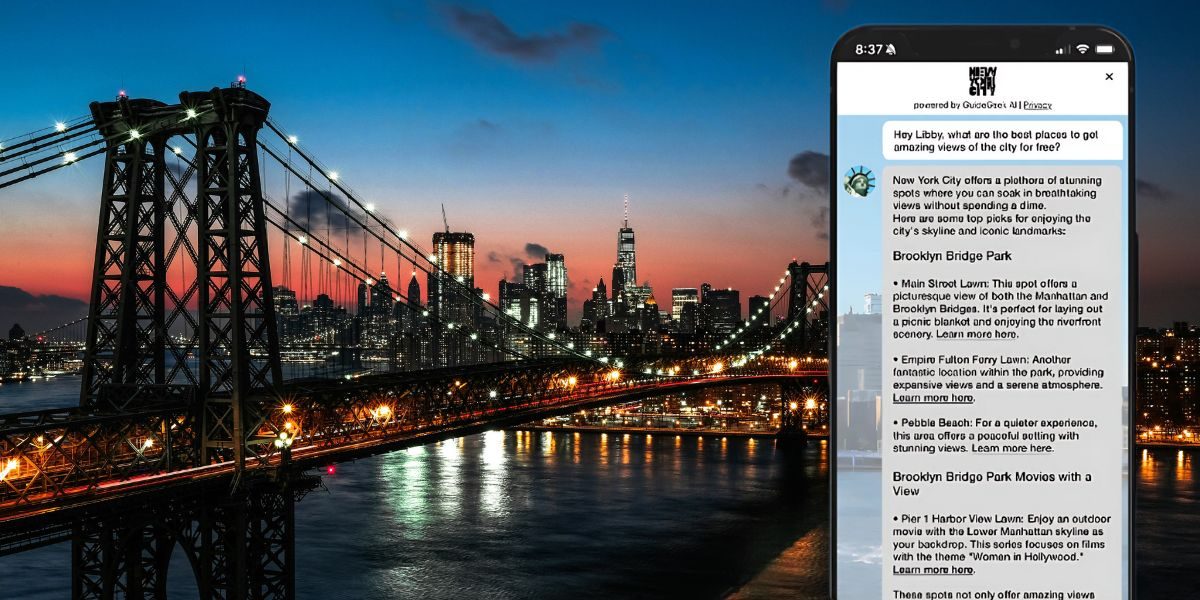By: Leander Moe
New York City Tourism + Conventions — the destination marketing organization and convention and visitors bureau representing all five boroughs — officially introduced Libby, an AI travel assistant specifically designed for exploring NYC. Built to deliver real-time answers to a wide range of travel or tourism questions about New York City in 60 different languages, Libby is driven by the advanced GuideGeek technology created by Matador Network.
Taking its name from the iconic Statue of Liberty, Libby is designed to support both international travelers and local New Yorkers. The tool offers on-demand suggestions for everything from famous landmarks to under-the-radar neighborhood finds. Drawing from NYC Tourism’s exclusive content and over 1,000 integrated travel data sources via GuideGeek, Libby aims to create customized itineraries, recommend dining and cultural experiences, and help users explore the five boroughs with greater ease.
From Ellis to Libby: Expanding AI Access from Business to Leisure
Libby follows the successful debut of Ellis, NYC Tourism’s initial foray into AI, launched in January. Aimed at business and event planners, Ellis was developed to handle professional inquiries, such as choosing venues or coordinating conference services. Accessible via NYC Tourism’s meeting portal and messaging apps, Ellis helped increase traffic to the bureau’s meetings website and boosted user engagement and email sign-ups in its initial month.
According to Julie Coker, president and CEO of NYC Tourism + Conventions, Ellis marked the beginning of a long-term strategy to integrate AI across the visitor experience. Libby extends that vision into the leisure space, offering AI support to tourists and everyday city explorers alike.
Where and How to Use Libby
Libby can be accessed through several digital touchpoints, including a chat icon on nyctourism.com, the official NYC Tourism website. WhatsApp and Instagram provide a user-friendly experience for real-time conversations with the AI while moving around the city. Also, more than 4,000 LinkNYC kiosks across the city will feature promotions and direct access to Libby at key transit and pedestrian locations.
With support for 60 languages, Libby ensures that international visitors may interact seamlessly in their native languages. Whether users speak Mandarin, Arabic, Spanish, French, or any other supported language, the assistant helps translate questions and responses in real time, reducing communication barriers.
Smart, Tailored City Advice
Matador Network CEO Ross Borden highlighted Libby’s ability to provide nuanced, user-specific recommendations: “Libby helps visitors and those exploring a new corner of the city instantly find restaurants, activities and hidden gems that really align with their interests and preferences.”
Travelers might ask, “Where can I eat late in Brooklyn on a Tuesday?” or “Which free events are happening this weekend in Harlem?” Libby responds with curated suggestions, powered by real-time data and local insights from NYC Tourism and GuideGeek’s 1,000+ sources of travel data.
The GuideGeek Engine Behind the Scenes
Launched by Matador Network in April 2023, GuideGeek is the AI framework supporting both Libby and Ellis. Designed for ease of use, the platform is available via chat on WhatsApp, Instagram, and Facebook Messenger. It offers itinerary creation, activity suggestions, dining tips, and up-to-the-minute local guidance.
Behind the scenes, GuideGeek uses reinforcement learning from human feedback (RLHF), allowing Matador’s human team to review AI conversations and improve the model over time. As a result, GuideGeek boasts an impressive accuracy rate of 98%.
Right Timing for a City on the Rise
According to NYC Tourism, Ellis generated more than 800 user queries in its first month, doubled site traffic, and increased newsletter signups by 150%. These results laid the foundation for Libby’s broader launch to the public, just in time for major global events like America 250 and the 2026 FIFA World Cup.
Libby arrives amid a notable upswing in New York City’s tourism sector. By the end of 2025, the city expects 67.1 million visitors, including 13.1 million business travelers — a full return to pre-pandemic levels. Looking ahead to 2026, New York is preparing to host eight FIFA World Cup matches and events around the United States’ 250th birthday. Libby is a key tool to help meet increasing demand for accessible, multilingual visitor support.
A Broader AI Shift in Global Tourism
AI tools like Libby and Ellis are helping shape a new era of tourism defined by personalization, efficiency, and accessibility, Borden says. Matador Network reports that over 80% of users say AI travel assistants have improved their experience by saving time, uncovering new destinations, and helping them adapt mid-trip.
GuideGeek is emerging as a central force in the AI travel ecosystem. The company has built custom AI tools for dozens of destinations, including New Zealand, Greece, Seattle, and Toronto.
With Libby’s arrival, New York City has taken a significant step toward modernizing the visitor experience by offering a free, multilingual, real-time digital concierge that lives in users’ pockets. It could also be beneficial for a lifelong resident exploring new neighborhoods in the city.
Disclaimer: The information provided in this article is for general informational purposes only. While Libby is designed to offer travel assistance and recommendations, user experiences may vary. The effectiveness of the tool depends on several factors, including individual preferences, location, and available data. Users are encouraged to exercise their own judgment and seek additional resources when planning their travel. The article reflects the current capabilities of the AI tool and is not intended to make claims about future performance or developments.

















